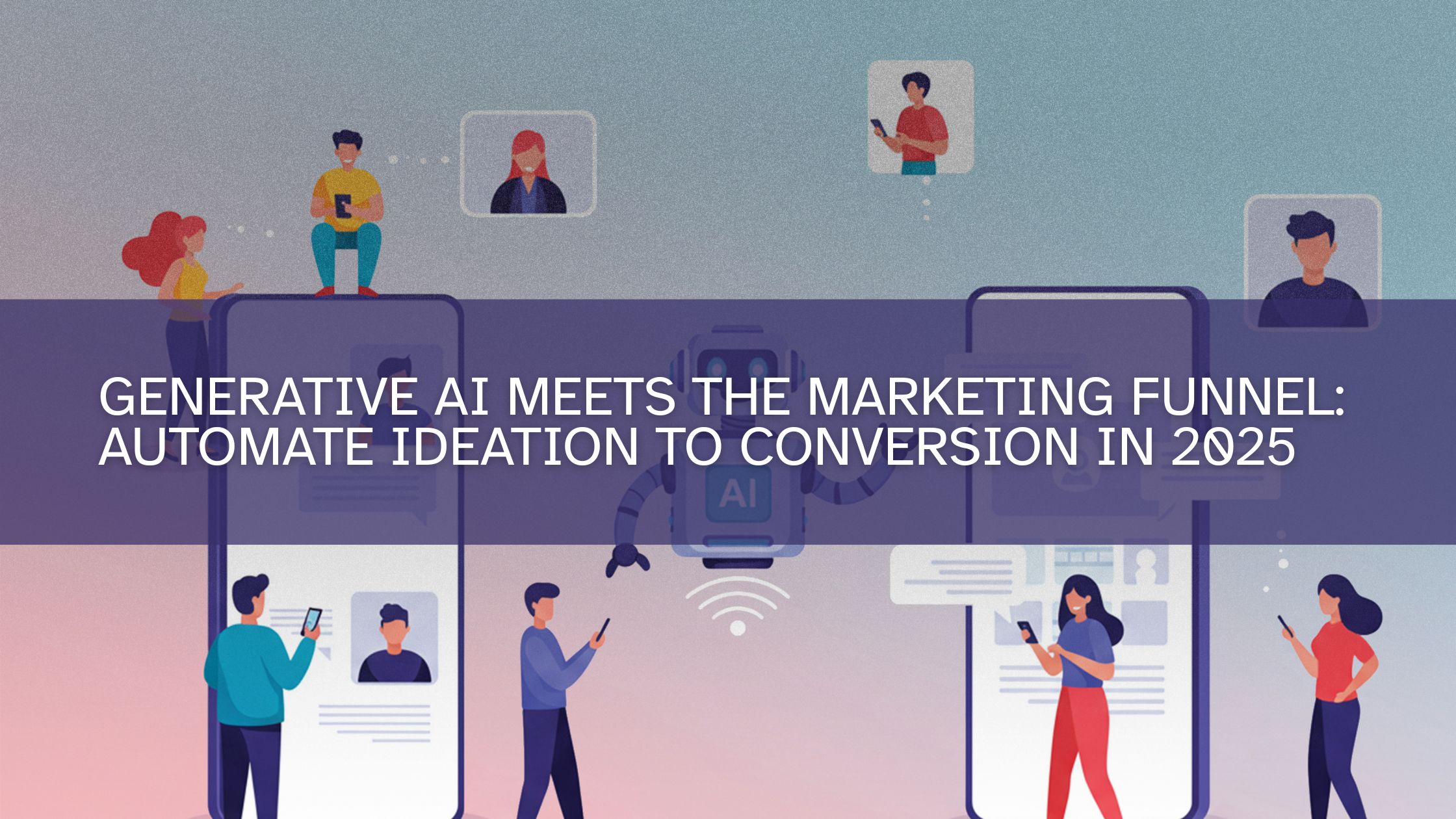Generative AI Meets the Marketing Funnel: Automate Ideation to Conversion in 2025




The convergence of generative artificial intelligence and marketing automation has reached a pivotal moment in 2025. As businesses grapple with increasingly complex customer journeys and rising acquisition costs, AI-powered marketing funnels are emerging as the definitive solution for sustainable growth. Companies implementing comprehensive AI marketing strategies are now reporting an average 300% return on investment, while 92% of businesses are planning to invest in generative AI tools within the next three years.
Key AI Marketing Statistics for 2025: ROI, Performance, and Adoption Metrics
Traditional marketing funnels relied heavily on static rules and broad demographic segments. Today's AI-powered marketing ecosystem represents a fundamental shift toward dynamic, intelligent systems that learn, adapt, and optimize in real-time. The transformation is evidenced by remarkable statistics: 76% of companies now see ROI from marketing automation within the first year, while businesses leveraging AI achieve 1.5× higher revenue growth compared to their peers.
Generative AI has emerged as the cornerstone of this transformation, moving beyond simple automation to enable creative intelligence at scale. Unlike previous iterations of marketing technology that merely executed predefined workflows, today's AI systems can ideate, create, personalize, and optimize content across every stage of the customer journey.
The most significant advancement in 2025 is the transition from reactive marketing approaches to predictive, proactive strategies. AI systems now analyze vast amounts of customer data—including behavioral patterns, purchase history, social media interactions, and real-time engagement metrics—to anticipate customer needs before they are explicitly expressed.
This predictive capability enables marketers to deploy personalized interventions at precisely the right moments in the customer journey. For instance, AI can identify early churn indicators and automatically trigger retention campaigns, resulting in up to 20% higher customer retention rates.
At the awareness stage, generative AI is revolutionizing content creation and audience targeting. AI content generation tools now enable marketers to produce blog posts, social media content, and video scripts at unprecedented scale while maintaining brand consistency.
Social media listening platforms powered by AI analyze millions of conversations in real-time, identifying trending topics, sentiment shifts, and engagement opportunities. These systems can detect when potential customers discuss relevant pain points, enabling brands to engage with helpful, contextually relevant content.
Predictive audience targeting represents another breakthrough application. AI algorithms analyze demographic data, behavioral patterns, and lookalike modeling to identify high-value prospects with remarkable precision. Companies using AI-driven targeting report 85% increases in click-through rates and 33% reductions in cost-per-click.
The middle funnel is where AI's personalization capabilities truly shine. Hyper-personalized email campaigns leverage machine learning to optimize send times, subject lines, and content for individual recipients. Netflix's recommendation engine exemplifies this approach, analyzing viewing history and preferences to deliver personalized content suggestions that drive continued engagement.
Conversational AI and chatbots have evolved beyond simple FAQ responses to become sophisticated lead qualification tools. Modern AI chatbots can engage prospects in natural conversations, qualify leads based on complex criteria, and seamlessly hand off high-value prospects to human sales representatives. These systems operate 24/7, ensuring no lead goes unattended.
Dynamic content optimization enables websites and landing pages to adapt in real-time based on visitor behavior, referral source, and historical data. This contextual personalization increases engagement rates and moves prospects more efficiently through the consideration phase.
At the decision stage, AI focuses on conversion optimization and real-time personalization. Advanced algorithms analyze user behavior patterns to identify conversion intent signals and deploy targeted interventions. This might include personalized product recommendations, limited-time offers, or additional social proof elements.
Predictive lead scoring has become increasingly sophisticated, incorporating dozens of behavioral and demographic variables to rank prospects by conversion likelihood. Sales teams report that AI-powered lead scoring helps them focus on the most promising opportunities, resulting in 10-20% improvements in sales ROI.
The retention phase represents one of AI's highest-impact applications. Churn prediction models analyze customer behavior patterns to identify at-risk customers before they disengage. Telecom companies, for example, use AI to detect declining app usage and increased support requests as early warning signs, enabling proactive retention interventions.
AI-powered loyalty programs move beyond static point systems to deliver personalized rewards and experiences. These systems analyze individual customer preferences and behaviors to offer relevant incentives that drive continued engagement and advocacy.
The financial impact of AI-powered marketing funnels is substantial and measurable. Marketing automation delivers an average ROI of 544%, with companies making $5.44 for every $1 invested. More importantly, 25% of businesses report revenue increases directly attributable to AI implementation.
Key performance indicators for AI marketing success include:
Despite impressive results, 74% of enterprises still struggle to capture sufficient value from their AI initiatives. The primary barriers include data quality issues, limited internal expertise, and integration challenges.
Data foundation remains critical for AI success. Organizations must invest in unified customer data platforms that consolidate information from all touchpoints. Companies with mature data infrastructure are three times more likely to achieve significant ROI from AI investments.
Skills development represents another crucial factor. 40% of marketers express desire to develop AI skills within the next two years, recognizing that human expertise remains essential for strategic oversight and creative direction.
Looking ahead, several trends will shape the evolution of AI marketing funnels:
Agentic AI systems will become more autonomous, capable of making complex strategic decisions without human intervention. These systems will continuously optimize campaigns, allocate budgets, and adjust strategies based on real-time performance data.
Omnichannel orchestration will reach new levels of sophistication, with AI coordinating customer experiences across email, social media, websites, mobile apps, and offline touchpoints seamlessly.
Privacy-compliant personalization will become increasingly important as regulations evolve. AI systems will need to deliver personalized experiences while respecting customer privacy preferences and regulatory requirements.
The integration of generative AI with marketing funnels represents more than a technological upgrade—it's a fundamental reimagining of how businesses attract, engage, and retain customers. Companies that successfully implement AI-powered marketing systems are not just improving efficiency; they're creating sustainable competitive advantages through superior customer experiences and data-driven decision-making.
The statistics are clear: AI marketing delivers measurable results across every funnel stage, from 300% average ROI to 20% improvements in customer retention. However, success requires strategic implementation, quality data infrastructure, and ongoing investment in human capabilities.
As we progress through 2025, the question is no longer whether to implement AI in marketing funnels, but how quickly and effectively organizations can transform their customer engagement strategies. Those who act decisively will capture the significant advantages that AI-powered marketing automation provides, while those who delay risk falling behind in an increasingly competitive digital landscape.
The future of marketing is here, and it's powered by the intelligent automation of generative AI across every stage of the customer journey.